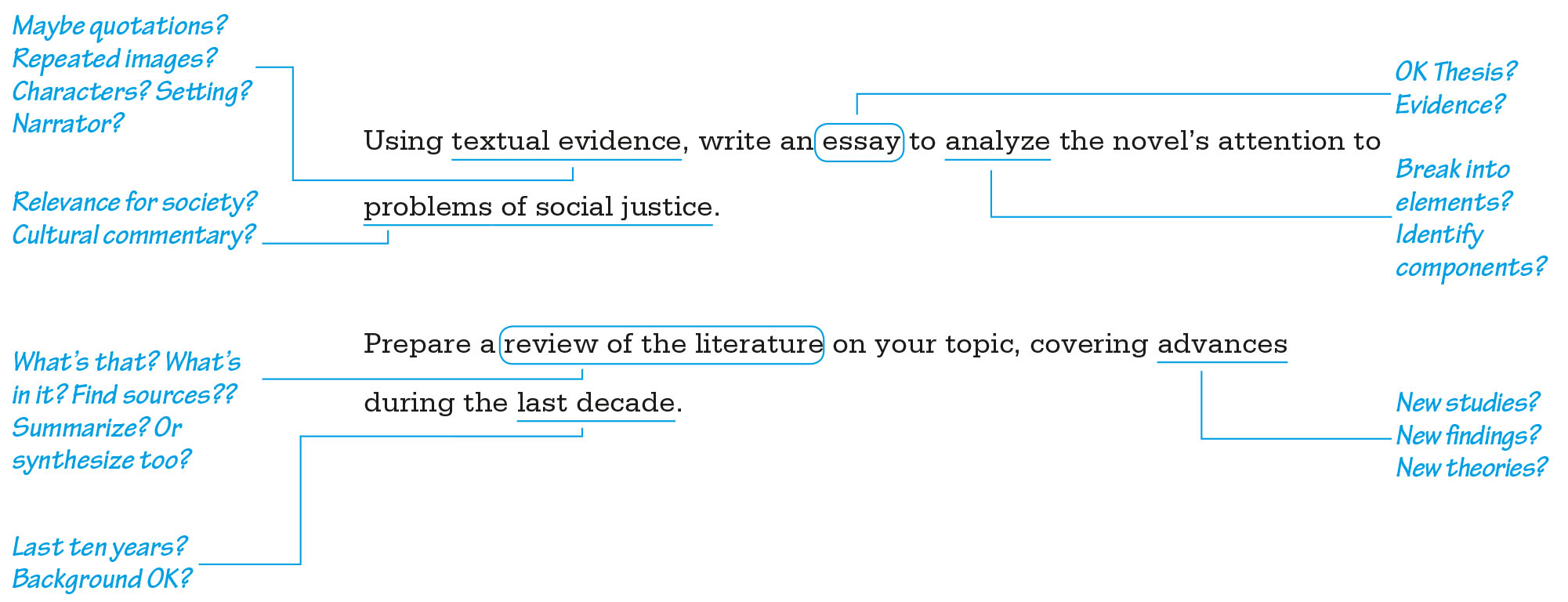What Is It?
Once you have figured out “what they want,” your next challenge is to determine “what it is.” As you read and write in a particular field, you may recognize common strategies or approaches. For example, historians frequently use cause-and-effect analysis, natural scientists rely on classification, nurses value accurate description, and specialists in many fields use comparison and contrast to examine cases, techniques, or theories. In addition, many assignments—such as lab reports, proposals, or reviews—require a genre, or type, of writing defined by specific characteristics and assumptions. Identifying assumptions and genre features will help you to tackle each kind of writing more successfully.
462
Uncovering Assumptions
In advanced classes, expectations of the field or discipline are likely to underlie those of your instructor. Here, your ingenuity is engaged not in the creation of an analytical approach or a method of investigation but in its application to your particular text, project, or research question. For example, your literature essay will probably rely on a close reading of a novel, poem, or play and take an accepted approach to analyzing the work’s characters, images, or other components. Your essay is unlikely to use headings such as Method, Results, or Discussion. However, those divisions are likely essentials for your psychology report on your field study. Such expectations about approach, method, organization, or format reflect the assumptions shared by scholars and researchers in a particular field—their deep agreements, for instance, that a literary study typically relies on textual analysis or that a psychology study typically follows certain research procedures.
When a field or approach is new to you, you won’t know if your instructor and others in the field already share established ideas about how a paper should develop. How can you find out what is assumed? First, use your experience as a college writer to check your assignment for clues—such as references, maybe without explanation, to a certain type of paper.

Click here for accessible version of above content.
Also consider the readings assigned in the course or field. For example, many journal articles in psychology, sociology, or education open with an abstract, summing up the reading. Should you add an abstract to your paper? Those same articles may have section headings with identical or similar wording. Should your paper use the same headings? Ask your instructor which features of assigned readings are expected in your paper.
By definition, assumptions and conventions (generally accepted ideas about ways to proceed) are taken for granted within a field. That’s why your instructor may assume that once you enroll in a course you already share a certain set of assumptions, even though you may assume those views are what you need to learn. That’s also why two researchers—for instance, an art historian and a chemist—could both investigate how to intensify color in a painting but hold different ideas about what’s of interest. One might study techniques for applying paint while the other might analyze formulas for mixing paint. Likewise, the engineers at your job probably view products differently than the marketing team does.
463
Whenever you enter a class, field, or situation that may operate on assumptions new to you, you need to notice what is preferred:
kinds of studies, analyses, or topics
research procedures, accepted methods, stages of analysis, or patterns of organization
methods of argument or explanation
kinds and quantities of evidence
use of technical vocabulary, authorial voice, transitions to show shifts, description or explanation, or other features
Then ask what sections, approaches, or features need to be included in your writing. Consider the unstated expectations or criteria that your writing situation—or the situation posed in your assignment—may imply.
Learning by Doing Reflecting on the Goals of Other Disciplines
Learning by Doing Reflecting on the Goals of Other Disciplines
Reflecting on the Goals of Other Disciplines
Examine an assignment from a different class. Drawing on your experience from this class, how can you best decode what the assignment is asking you to do? For example, is the assignment asking you to analyze a problem, compare and contrast two scenarios, or explain a cause and its effect? How might you approach this assignment given the skills you have learned from this class and this chapter?